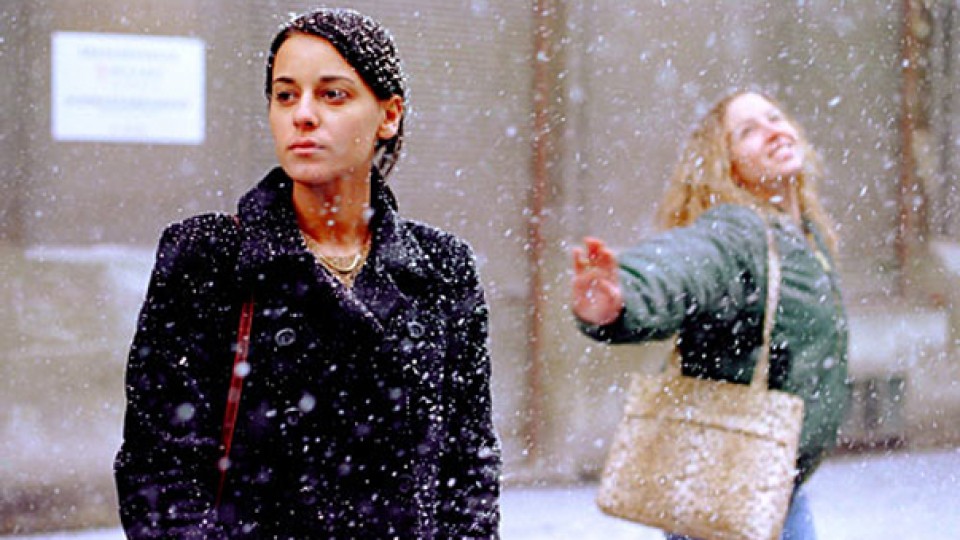Austrian Day, May 17 A man photocopies a picture of himself so many times that the world is filled with animated figures of
his image. In Virgil Widrich's Copy Shop the theme of the loss of identity in a timeless space is packed into just 11 minutes.
Ten films made between 1982 and 2002, between 11 and 240 minutes in length, show the wide variety of approaches, both aesthetic
and thematic, employed in cinematic searches for identity: Austrian emigrants confronted with their homeland as American occupiers
(Welcome in Vienna), young Viennese adults try to shake off the constricting and suppressed legacy of National Socialism in
an orgy of violence (The Excluded), 14-year-olds discover love and power (Be My Star, Flora), 20-year-olds bring fresh air
from the East to Vienna (Nordrand), an elderly woman in a bitter struggle with her youth (Blind Spot. Hitler's Secretary),
and more or less exotic ethnic groups in the shadow of globalization (Elsewhere). Many different expressions of independent
voices developed within a short time frame. The Austrian Dayfilm program will present ten works that mark the various regions
explored by contemporary filmmakers - a landscape which has received an increasing amount of attention from abroad over the
past few years. The Excluded (1982), based on a novel by Nobel Prize-winner Elfriede Jelinek, who also wrote the script, is
the earliest example which will be shown: Equally provocative and uncompromising as the language, director Franz Novotny's
disturbing images depict the feeling of discomfort experienced by young adults in the late 1950s and their forcible liberation
from the taboo-laden, repressive family life of the time. The National-Socialist past, repressed and swept under the carpet,
forced its way to the surface, becoming one of the dominant themes in Austrian film.
In Welcome in Vienna (1986) Axel Corti returned to the year of the turning point, 1945, confronting victims and perpetrators,
occupiers and the defeated, followers of the Nazi wave and idealists in this 'zero hour' with a difficult question, that of
how their stand beforehand and afterward differed. This conflict has lost none of its power after almost six decades: In the
documentary Blind Spot. Hitler's Secretary (2002), Traudl Junge, then in her 80s, talks with disarming openness about the
burden weighing on her conscience since her youth. The 1990s brought sociopolitical change, and the fall of the Iron Curtain
found a place in the themes of a numerous films. Barbara Albert is not only among the first directors who, in her first fiction
film, Nordrand, addressed the new energy entering through the now-open border. Albert is also one of several woman filmmakers
who graduated from Vienna's Film Academy in the late 90s, then caused international sensations with full-length or short films:
Cannes' Cinéfondation and Un Certain Regard presented the work of Jessica Hausner (Inter-View, Lovely Rita, Hotel) and Ruth
Mader (Zero Deficit, Struggle), and Barbara Albert debuted in competition at the Venice festival, where the female lead of
Nordrand received the Best Young Actress award. Four of the shorts were made by these young women - early works, all of them
were produced at the Film Academy. One takes a sensitive and childlike look at the enigma of sexuality as colored by a Catholic
upbringing (The Fruit of Thy Womb) - a terse and radical story tells us about the merciless law of the jungle which rules
among children of the same age in a bleak neighborhood on the edge of the city (Punks) - the third and fourth deal with initial
experiences with love (Be My Star, Flora).
The beginning of the new millennium was accompanied by documentary filmmaker Nikolaus Geyrhalter and his impressive project,
which provided a contrast to the media hysteria in the face of the year 2000 and the disappearance of borders around the globe.
In Elsewhere he dedicated a four-hour journey to remote areas on the edge of the globalization process and a sustained gaze.
A look elsewhere concludes this brief presentation of the many worlds of Austrian cinema and opens a borderless space for
its search for identity.
Karin Schiefer
© 2005 Austrian Film Commission

